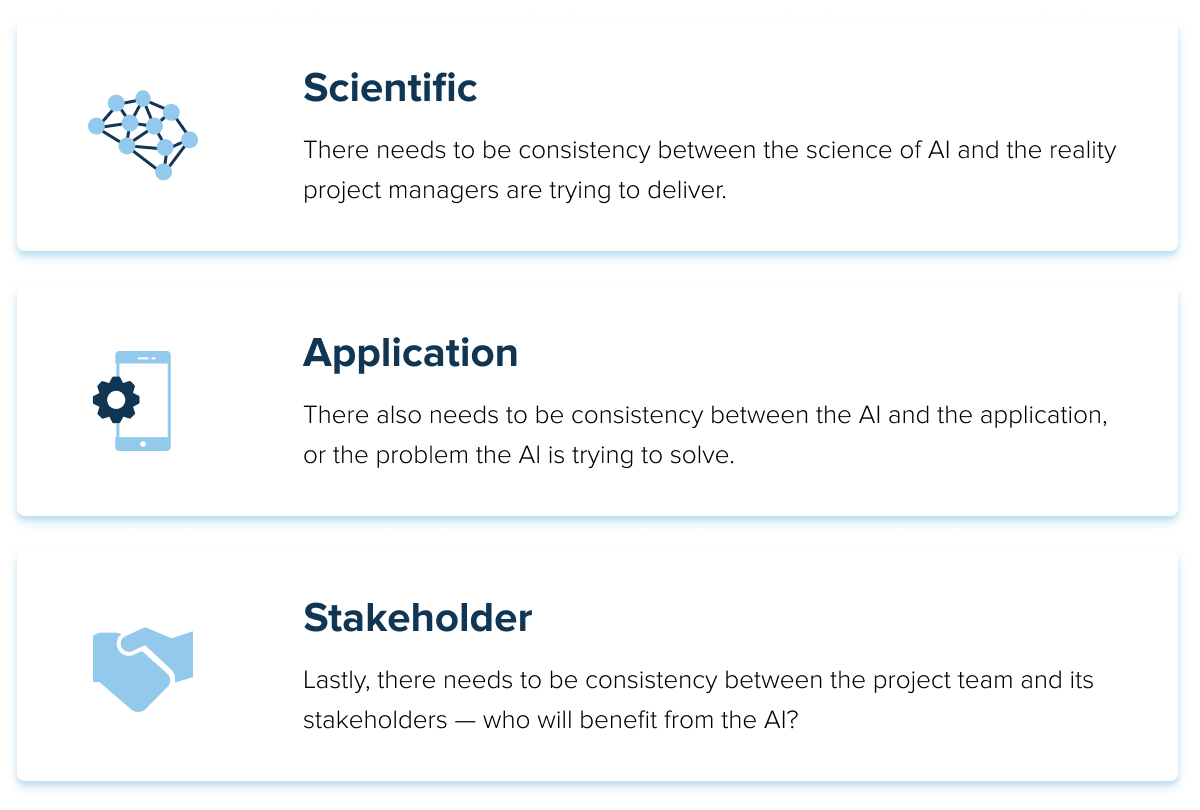There’s no question — artificial intelligence (AI) projects are the next big thing in technology. Companies of all sizes are working on successful AI projects and advanced AI and machine learning (ML) projects to deliver value to other businesses and consumers.
However, what most people don’t know is that the majority of AI-based projects fail. This is not to say that AI and ML projects are not worthwhile — if it weren’t for these failed projects, there would be no progress in the rapidly growing field of AI.
Take a deep dive into this comprehensive article, which covers AI project success criteria, some of the coolest AI projects out there and examples of AI project ideas that will become more popular in the next few years.
An overview of AI and its related fields
No one can overstate the hype surrounding AI. More and more companies are joining the AI revolution, as the technology is expected to revolutionize just about everything. As a refresher, AI refers to a machine or computer’s ability to perform tasks by mimicking human intelligence.
There are also several subsets of AI, most of which describe even smaller subfields. Some examples include:
- Machine learning
- Robotic process automation
- Natural language processing (NLP)
- Artificial neural networks.
For example, deep learning is a subset of machine learning and speech recognition is a subset of NLP. The world of AI is growing, becoming broader as the days go by. New technologies are continuously developing, so it only makes sense that AI is an umbrella term used to describe any machine or system capable of thinking like a human.

Source: Unsplash
AI-based software is one of the most common AI projects researchers and engineers will create. Businesses require AI development to streamline and automate their employees’ workflows.
Automation can often lead to higher efficiency and productivity. This ultimately gives companies a competitive advantage in the fierce marketplace. For example, manufacturing facilities can use AI to improve their supply chain operations and increase shipping speeds. Warehouses can automate many processes, such as picking and packaging. The possibilities with AI are seemingly endless, especially in the business world.
What are the different types of AI?
There are a few levels of AI — reactive, self-aware, theory of mind and limited memory. Continue reading to learn more about each type and what makes them unique.
1. Reactive machines
Reactive AI is considered the most basic type of AI. These machines have intelligence built around specific rules set forth by AI programmers. Intelligence found in reactive machines exists only in the present — in other words, they have no concept of the past or future.
Programmers can also incorporate neural networks into reactive machines, allowing AI to learn and adapt to new situations. Reactive machines are somewhat limited in their capabilities, as they cannot form memories like humans. Some common examples of reactive devices include IBM Watson and AlphaGo.

Source: Unsplash
2. Limited memory
Limited memory is the next level of AI. As its name suggests, these machines may not be forming new memories, but they know a past and future exists. They can use historical data to influence decision making in real time, but it does not save the information for future tasks.
A prime example of limited memory AI is a self-driving car, such as a Tesla model. Autonomous vehicles continuously monitor their surroundings and can take action based on their environments.
3. Theory of Mind
The next type of AI worth mentioning is theory of mind. The theory of mind level includes all the same features as reactive machines and limited-memory AI models. However, in this case, the AI has a “mind.” AI can learn other things — such as people and animals — have minds and eventually come to understand that minds produce thoughts and emotions.
There are no current examples of theory of mind AI models, but some robotics attempt to reach this level. For example, the viral Sophia robot by Hanson Robotics is a highly advanced AI, but it still has yet to reach this level.

Source: Unsplash
4. Self-aware
Self-aware AI is the most complex type, as it knows precisely what it is and has true consciousness. Self-aware AI is often in popular science fiction films like Ex Machina and iRobot.
Like humans, self-aware AI can form memories based on past experiences, potentially “feel” emotions and make accurate predictions. An essential feature of self-aware AI is its ability to evolve, learn and become more intelligent over time, just as a human would. There are no current artificial intelligence projects that fall into this category — yet.
AI project success criteria: 5 factors
As mentioned above, only a select few AI and machine learning projects have succeeded in the past. Since AI is such a complex, nuanced field, only a handful of companies can form the most advanced AI models.
However, there are a few AI project success factors anyone involved in AI should know if they’re looking for guidance on their AI projects. Without these AI project success criteria, the top AI projects in the world may have never emerged.
1. Define clear objectives
Many artificial intelligence-based projects fail because the project owner fails to identify the primary purpose — or create an AI strategy — of the project. Any experiment without clear objectives will likely fall short of expectations, no matter how skilled the team working on it is.
Before starting an AI project, the individual must outline what the AI should do, what problem it should solve and other vital factors. For example, there should be a timeline and milestones to follow to help guide the team through the AI lifecycle. Companies can also consider partnering with an AI strategy consulting firm, which assists with brainstorming potential AI project strategies and solutions.

Source: Unsplash
2. Choose the right team members
Again, like any project, individuals working on a new AI or machine learning development should decide which team members they need to collaborate with. There’s currently a shortage of data scientists and AI engineers despite the growing demand for these professionals in the business landscape.
However, it’s important for project managers to find the appropriate staff members to ensure they bring their skills to the table. If necessary, companies can take advantage of AI consulting opportunities to help guide them with team member selection. With the right team, anything is possible.

Source: Unsplash
3. Communicate regularly
Another way to measure the success of an AI project is to determine if team members are communicating enough. During an AI project, there will be plenty of questions circulating within the team, and it’s up to the project manager or leader to answer them.
With adequate communication, completing the project will prove easier. Data scientists, AI engineers and experts need to communicate effectively and often to reach the final goal of developing a usable AI model.

Source: Unsplash
4. Provide technology and tools
There are several essential technologies and tools that team members must have access to and knowledge of to make an AI project successful. For example, it would help if teams had a few programmers with experience in languages such as Python, Java or C++. Some projects — such as an AI and IoT (Internet of Things) projects — should also include the necessary IoT devices to ensure there’s enough data to work with.
Data scientists should be well-versed in data architecture, including data collection, storage, cleaning and analysis. Additionally, AI engineering professionals should be able to help project managers get the project up and running. Keep in mind that providing the right tools and technologies will often come with high upfront costs, so it’s also crucial for managers to create an optimized budget.
5. Scientific, application and stakeholder consistency
According to the MIT Sloan School of Management, AI projects should focus on three core consistencies — scientific, application and stakeholder. Here’s a brief overview of each consistency and why it matters in AI projects:

Following these success criteria for AI projects can help guide people of all levels. They represent what needs to be done for an AI project to work well. While there are other project success measurement methods for AI initiatives, these primary criteria will prepare both beginners and experts in the field.
5 of the most successful AI projects
Some of the coolest AI projects are consumer products society has come to know and love, from customer experience consulting to household devices. While there are fairly advanced AI projects, many modern projects also provide simple, user-friendly interfaces for users, especially since the average consumer might not know how to operate a complex AI model.
Here are some of the most successful AI projects to date.
1. IBM Watson
IBM Watson is likely the most famous AI system, considering it was once featured on and won an episode of Jeopardy. The highly regarded AI belongs to IBM and is built specifically for business.
Watson can help organizations improve prediction outcomes, automate complex processes, optimize employees’ time and provide valuable solutions to common pain points. Some of the largest, most well-known companies — such as Thomson Reuters, General Motors, Salesforce, KPMG and Prudential — are clients of IBM Watson.
2. OpenAI ChatGPT
Anyone involved in AI or the tech landscape understands how revolutionary OpenAI’s new ChatGPT is. Members of the healthcare, education and marketing sectors are all talking about ChatGPT and its impressive capabilities.
The AI model engages in humanlike conversations by responding to user prompts. Users can type in just about anything and see what ChatGPT generates. Some professionals fear ChatGPT is too advanced for its own good, but only time will tell if the tool will positively or negatively affect the tech world.
These cool artificial intelligence projects are only a handful of what exists in the AI space right now. Artificial intelligence-based projects are the foundation of the AI landscape, so both novices and experts must engage in ongoing research and initiatives.
3. Microsoft Cortana
Another artificial intelligence-based project is Microsoft’s Cortana. According to Microsoft’s website, Cortana is a personal productivity assistant for Microsoft 365 users. The Cortana voice assistant is available on Teams devices and the Teams mobile app, and can make several tasks within the Microsoft 365 suite easier to use.
For example, Cortana can:
- Manage a user’s calendar and appointments
- Read a user’s emails
- Create and manage lists
- Set alarms and reminders
- Open apps on a user’s computer.
Cortana is a software developed to rely on spoken natural language to communicate with users.
4. Amazon Alexa
Another digital voice assistant that’s considered an AI project is Amazon Alexa. Most smart homes nowadays use Amazon Alexa and Alexa-compatible devices to work properly. For example, there are now smart thermostats, speakers, TVs and tablets that work alongside Alexa to create the homes of the future.
Voice-enabled devices like Alexa leverage conversational AI, which is becoming increasingly popular in AI projects, especially as chatbots and other automated features become commonplace across industries.
5. Google Brain
Google Brain started in 2011 and has taken off ever since. Some notable breakthroughs of Google Brain’s research team include the introduction of TensorFlow, Transformers, BERT and AutoML. According to its official website, some research categories Google Brain is focusing on are:
- Machine intelligence
- Machine perception
- NLP
- Robotics
- Machine translation
- Software systems.
Other important Google projects are laMDA, Learning for Code, Magenta and MetNet. Google will continue on its path of success in the AI field, especially as the company grows.
Whether AI professionals take on small AI projects or advanced AI projects, creating AI helps the field grow and become a staple across various industries, from manufacturing to retail and everything in between.
AI to dominate tech sector in the next few years
AI projects will continue evolving. Since AI has yet to reach its full potential, there’s no way to know what types of projects will emerge. It is, however, fair to say AI will soon dominate the tech landscape. Professionals across all sectors will need to be aware of AI’s capabilities and prepare for more AI-based solutions.
Author bio
April Miller is a senior writer with more than 3 years of experience writing on AI and ML topics.
Introduce AI into your business with InData Labs
Contact us to acilitate decision-making by making the processes faster and smarter, enabling multi-tasking and easing the workload for existing resources with the AI technology.



